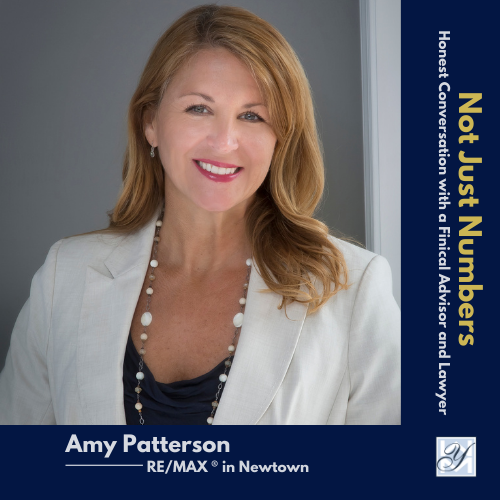Episode 27: Navigating Conflicts with Financial Advice Then Joined by Realtor Amy Patterson
Hosts: Madison Demora and Mike Garry
Guest: Amy Patterson, Realtor at Remax in Newtown
Episode Overview
In this enlightening episode of “Not Just Numbers,” host Madison Demora and Mike Garry discuss hidden conflicts in fee-based financial advisory services, exploring how different compensation models affect client recommendations. The episode features an in-depth conversation about the Wall Street Journal article on fee-based advisors and potential conflicts of interest. In the second segment, they’re joined by experienced realtor Amy Patterson, who shares valuable insights about the current real estate market, including the surge in cash buyers, changing market dynamics, and her journey in the industry since 2005.
Listen to Our Podcast On:
Timestamps
- 00:09 – 03:28 – Introduction to episode topic: Hidden Conflicts Arise with Fee-Based Advisors
- 03:29 – 11:12 – Impact of Shift Towards Fee-Based Advisors and Social Security Claiming Behaviors
- 11:13 – 16:18 – Retaining Mortgages in Retirement
- 16:19 – 20:15– Reluctance to Recommended Annuities
- 20:16 – 21:28 – Increase in Older Households Holding Mortgages into Retirement
- 21:29 – 24:54 – Mitigating Conflicts in Financial Advising
- 25:00 – 01:08:50 – Interview with Realtor Amy Patterson
Connect with our special guest
Amy’s website: amypatterson.remax.com
Contact Amy: amypatterson.remax.com/contact.php
Amy’s Instagram:www.instagram.com/direct/t/105873184146145
Follow Us on Social Media
Stay updated with the latest episodes and news by following us on social media:




Mike: Sure. So basically, what they said was that there was research out there that suggests that commission based brokers, clients claimed Social Security earliest. Fee based advisors charged clients claimed less, you know, like a little bit later than them. But then people without advisors claimed last or latest, and it really just said that and then made the implication that maybe the advice is biasing people, maybe the advisor is telling their clients to claim Social Security earlier. I think it could be an area where there’s correlation but no causation. What I just relayed is all they said about the research, nothing about how it was done or how many people, or the questions, how it was done. And so I think in this area, what the implication is, say, I manage your account for you and you have the choice of whether to take Social Security or not. And if you take Social Security and you and your spouse have $50,000 a year in Social Security income, that’s $50,000 a year that you don’t have to take from your, from your account. That means that your advisor makes more money from that. Right. That’s a clear conflict of interest for an advisor. I will tell you in practice, though, we suggest to all our clients to wait. Unless they have known health concerns, like they have some sort of illness that is going to reduce their projected longevity. If they have that, then, yes, they should probably claim soon. But if not, we ask them to wait, and a lot of them will wait. A lot of them are on board with it, and a lot of them won’t, especially people that retire at 60. The thought of waiting ten years to collect Social Security, they have a hard time with it. I would suggest that you poll our clients where we’ve had these conversations about whether they should claim Social Security, where they think we stand on it. Because I would say over and over again, we plead with people to wait and then ultimately, they’re going to do it when they want to do it. And so, again, they have that research that suggests that they make a suggestion from. But there’s no kind of proof in that, there’s no real correlation. There’s no, I mean, there’s no real causation. There’s just the correlation. It’s always interesting. I would say that I would doubt that we are alone. Right. Like Maureen just started working here five months ago, and she has the same conversations I do with people. We talked to them about waiting. We show people in the financial planning software what the difference makes. And sometimes it makes a giant difference in whether somebody’s plan works or not, that they delay. But I think that part of it is people have a hard time with it because they can’t leave Social Security to their spouses or their children, but they can leave their accounts. And I think that a lot of times they feel like it’s one versus the other instead of the way that we look at it is it’s part of your overall financial picture. Claiming Social Security and the strategies around that and your different accounts, whether they’re taxable brokerage accounts, IRAs, Roth IRAs, and they all work together. And the idea is to come up with a plan to maximize how much money you’re going to be able to use, spend, give through your lifetime. And claiming Social Security later is almost always the right idea, but we can’t make people do it. We will keep trying, though.
Madison: Alright. So why do some advisors advocate for retaining mortgages into retirement? And what are the potential conflicts of interest associated with this recommendation? And how might this strategy impact retirees financial wellbeing?